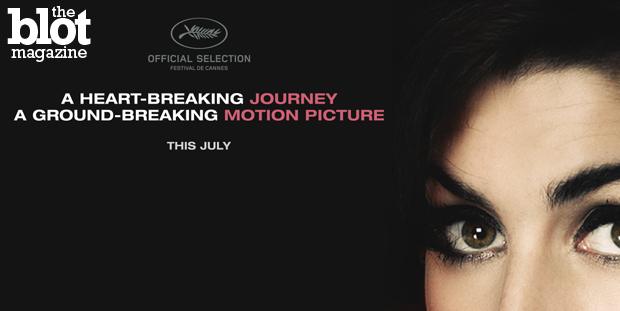
Amy Whitehouse is overrated
“Amy” premiered at Cannes Film Festival last month. It’s a movie that celebrates and explores the short life of singer-songwriter Amy Winehouse. It’s a gripping and thorough examination of the gifted artist behind the mountainous beehive and signature eyeliner.
Winehouse’s hit song “Rehab” came out in October 2006, and by July 2011, the 27-year-old singer/songwriter was dead from alcohol poisoning. The first time I heard the catchy hook, “Rehab” became a worm in my head. I felt guilty for loving the song so much because it sounded like a deafening cry for help.
After hearing it, I hurriedly bought “Back to Black,” the album it was on, and Winehouse’s first record, 2003’s “Frank,” then I began memorizing the lyrics. The songs were a rich mix of soul, jazz, reggae, rock and rhythm ‘n’ blues, but after Winehouse died, I couldn’t listen to any of it anymore. Too gut-wrenching. “Rehab” and “Back to Black” earned Winehouse five Grammy Awards in 2008 in the Best New Artist, Best Pop Vocal Album, Record of the Year, Song of the Year and Best Female Pop Vocal Performance categories.
Imagine being so celebrated for your addiction. The lyric that troubled me most was the phrase about refusing rehab, “I ain’t got the time, and if my Daddy thinks I’m fine …” It sounded like a child screaming, “Daddy, look at me. I’m in trouble. Can’t you hear me?” Mitch Winehouse, Amy’s dad, seemed to be the worst choice she could’ve picked to lean on as he came across as a blood-sucking opportunist, just as he does in “Amy.”
On a personal note, I went to rehab at age 26. If I hadn’t, I’d be dead. Yes, things were that bad. So, although I had mixed feelings about seeing “Amy,” I felt compelled to screen the film, especially when I learned it was by the same award-winning team behind “Senna,” a documentary about Ayrton Senna, a Formula 1 racecar driver who died way too young.
Asif Kapadia’s movie about Winehouse’s life is brilliant perfection. The documentary that doesn’t feel like a documentary honors and investigates who Winehouse was before the drinking, the drugs, the bulimia and the self-destructive clinging to both her father and ex-husband Blake Fielder-Civil.

TheBlot Magazine caught up with filmmaker Kapadia to learn more about “Amy,” which will be released in the U.K. Friday, July 3 and worldwide Friday, July 10.
Dorri Olds: What can you say about the emphasis on the song lyrics in the film?
Asif Kapadia: Everything you need to know about Amy’s life was there in her lyrics. Every single song is based on a real incident. She documented her own life. “Stronger Than Me” is all about that. She wants someone who’s stronger than her. “What Is It About Men?,” “Love Is a Losing Game.”
The lyrics could stand apart as a book of poetry.
She’s a great writer. I think that was the big revelation. Her voice is what everyone talks about, but I think the writing is even better. It’s the most difficult thing in the world to write something original, something that will stand the test of time. A blank piece of paper — what do you do? What I like is it’s personal, based on a real incident, but it’s intelligent. It’s humorous. It’s got references in there. It’s very London-y. It’s not copying American writing. Everything is there for a reason. It’s textured. It is like poetry. It could be published [that way]. It’s beautiful.
How did you choose to go with voiceover and images versus talking heads?
The spine of the film is her songs and her performances. I was like, “I don’t even want the record. I want live performances.” I love it when she picks up a guitar and sings. At the beginning, I didn’t know if the archives exist. My instinct was to show her face. Her eyes tell you everything.
What did you learn while making the film?
I had no idea she was so intelligent and funny. She was a laugh. You would have liked to hang out with her.

Was there anything creative after her second album, “Back to Black”?
She tried, but nothing was completed. There are beginnings of songs, bits of music. There were lots of attempts. “You Always Hurt the Ones You Love” is something she tried to write. There were actually songs she wrote in a big creative spurt around what became “Back to Black.” But, no, there wasn’t anything else, sadly. The problem became partly to have a big hit. What do you follow up a hit with? You need a bigger hit. I wanted her to have a failure. I wanted her to knock out an album, an experiment, a weird in-between album that’s a piece of crap. Then maybe she’d be free to do her hip-hop album or her jazz album or something. Like Amy said in interviews, she wasn’t interested in huge success and playing Vegas. She wanted to keep pushing herself creatively, and I think she wanted to do something different. The industry wasn’t happy with her doing different. They wanted more of the same.
Were you surprised by the bulimia? I hadn’t known about that before the film.
Yeah, of course. There’s an interesting thing, it’s hiding in public. I’ve heard a lot of audio interviews with Amy, and every interview was in a restaurant. She was always eating, but she was always losing weight. That food was not staying in her body. But the last few years of her life she did not eat.
More:
How did learning about her creative process influence your film?
This is a film about an artist. It’s about the creativity. It’s about her having an experience and writing it. Then we had these diaries in her handwriting. It’s not particularly a cinematic idea, filming someone’s diary but actually, with her it is because her handwriting is amazing.
As Mos Def said to me, “If you’re a solo artist, if you’re a writer, a performer, you’re a singer, you’ve got to be in charge of the bus. You’re driving the bus, nobody else.” Unfortunately, she wasn’t. That’s what happened with her, she wasn’t in control.
What project are you working on now?
Yeah, I’m doing a drama now to get away from these archive films. I should be editing right now. I popped out for a sandwich, but now I’ve been away for a week. It’s called “Allie and Nino,” and I’m at the beginning. It will come out next year.
“Amy” opens in the U.K. Friday, July 3 and worldwide July 10. Documentary, biography, music. Rated R. 128 min.
Watch the trailer:
Watch an excerpt from this interview:
Dorri Olds is a contributing journalist for TheBlot Magazine.





